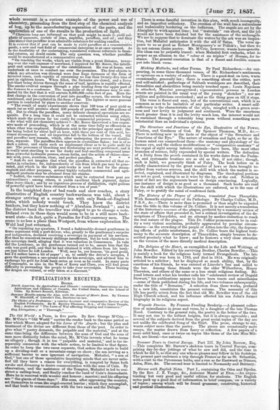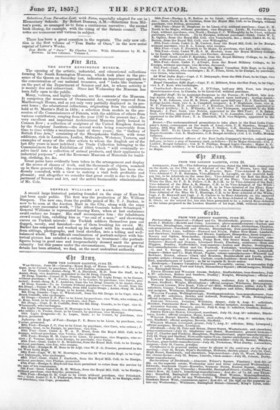PUBLICATIONS RECEIVED.
Booxs.
North America, its Agriculture and Climate : containing Observations on the Agriculture and Climate of Canada, the United States, and the Island of Cuba. By Robert Russell, Kilwhiss.
&miner Months among the Alps, with the Ascent of Monte Rosa. By Thomas W. Hinchliff, of Lincoln's Inn, Barrister-at-law.
The Choice of a Profession : a concise Account and comparative Review of the English Professions. By H. Byerley Thomson, B.A., of the Inner Temple, Req.; Author of " The Laws of War affecting Shipping and Commerce." Guy Livingstone; or " Thorough."
The Old World : a Poem, in five parts. By Rev. George M'Crie.— Mr. M'Crie's "Old World" carries the reader back to the same period as that which Moore adopted for his Loves of the Angels; but the plan and treatment of the divine are different from those of the poet. In order to give what "poetry demands, the palpable and the material," and at the same time bring the difference between the sons of God and the sons of men more distinctly before the mind, Mr. M'Crie invents what he terms an allegory ; though it is too "palpable and material," and is too inseparably connected with the whole action to be limited to that figure. In order to keep the two races separate, God orders the angels to build up a dividing-wall or a mountain-range on shore ; the sea serving as a sufficient barrier to men ignorant of navigation. Mahaliel, "a son of God," but one of those speculative inquiring minds that are never satisfied till they have a reason for everything, is tempted by Satan both awake and dreaming to desire communication with the sons of Cain. By observation' and the assistance of the Tempter, Mahaliel is led to construct a sailing-boat, and finally reaches the land of Cain's descendants. Here he is received with wonder and honour marries; and his offspring are "the giants of thou! days." His sons, after oppressing the coun
set themselves to cross.the angel-erected barrier ; which they &camp and that leads to communication with the two races and the Deluge.
There is some fanciful invention in this plan, with much incongruity, and an imperfect orthodoxy. The erection of the wall has a naturalness and technicality bordering on the ludicrous. The angels are set by the Almighty to work against time; but "materials" run short, and the job would not have been finished but for the assistance of the archangels. We are to suppose that to dominate the waters by the ark was an inspiration, but Mahaliel anticipates it with the aid of Satan. The verse appears to us as good as Robert Montgomery's or Pollok's ; but then we do not esteem theirs poetry. Mr. M'Crie, however, wants homogeneity. His ideas can be palpably traced: when Mahaliel first embarks, what so proper as an allusion to the " robur et cos triplex" of Horace, for instance. The general execution is that of a fluent and forcible sermon put into blank verse.
Miching Mallecho and other Poems. By Paul Riehardson.—An outpouring, in some three thousand verses of Mr. Richardson's sentiments
or opinions on a -variety of subjects. There is a good deal on love, warm occasionally, generally lax ; there is something about the critics, pert and self-satisfied ; gatherings of Sabbath worshipers are described, their formalities and absurdities being mainly touched upon ; Louis Napoleon is attacked, Mazzini panegyrized ; representative persona in London streets are painted in the usual way of the young " sketcher " •' nor are polities and politicians overlooked ; and so the thing goes on till it stops.
The verse is fluent and easy, but of the conventional cast, which is so common as not to be imitative of any particular writer. A smart selfsufficiency is the characteristic of the style min' gled with a green sourness and raw levity in judgment and sentiment. Were the smartness much greater than it is and the levity much less, the interest would not be sustained through a tolerably long poem without something more substantial than an individual's opinions.
The Structure and Functions of the Eye, illustrative of the Power, Wisdom, and Goodness of God. By Spencer Thomson, M.D. lie.— There is nothing new in the factsor the object of "the Structure and Functions of the Eye." The nature of sensation and light, so far as the human mind can comprehend them—the anatomy and physiology of the human eye and the endless modifications or "comparative anatomy" of the organ Of sight among inferior animals—have been, like most other branches of science, fully expounded by special writers. The deduction of a Deity from the proofs contained in his works dates from the Psalmist, and systematic treatises are as old as Ray, if not older ; though, such is habit, we generally think of Paley. The book before us is chiefly characterized by the great number of laws or facts brought together from various sources, and the skill with which the matter is selected, explained, and illustrated by diagrams. The theological portions are not so good, coming in as it were by the by, at the end. Neither in point of fact are the arguments based on design convincing. Logically, One instance of design is as good as a thousand. Such books are read for the skill with which the illustrations are enforced, as in the case of Paley, or to gratify the mindd, of confirmed faith.
The History of the Plague of Athens, translated from Thucydides. With Remarks explanatory of its Pathology. By Charlps Collier, M.D., FRS., &c.—There is more than is promised or than might be expected from the title in this volume of Dr. Collier. It is not merely a translation of the historian's a000unt of the plague, prefaced by a summary review of the state of affairs that preceded it, but a critical investigation of the descriptions of Thucydides, and an attempt by medico-induction to reach the real nature of the plague. This Dr. Collier pronounces to be in reality a very violent scarlatina, probably aggravated by peculiar circumstances—as the crowding of the people of Attica into the city, the depressing effects of public misfortunes, &e. Dr. Collier bears the highest testimony to the accurate description of Thucydides, simply because he described precisely what he knew; and he bestows a very close attention on the version of the more directly medical description.
The Religion of the Heart, as exemplified in the Life and Writings of John Bowdler. Edited by his surviving Brother, Charles Bowdler.—This is mainly a book for the religious body termed Evangelicals. The late John Bowdler was born in 1783, and died in 1814. He was originally articled to a solicitor ; but he displayed so much ability, that, by the exertions of his friends, he was entered at Lincoln's Inn and called to the bar. Among those friends were the elder Wilberforce Henry Thornton and others of the same or a less strait religious feeling. Beyond letters and what his brother calls his "celebrated review of Dugidd Stewart," his publications appear to have been tracts and miscellanies —some of them published during his life, and two volumes subsequently, Under the title of "Remains." A selection from these works, prefaced by a new life, constitutes the present volume. The necessity of this life has partly arisen from the fact that old Mr. Bowdler was of the old High Church school, and his influence affected his Son John's former biography in its religious aspect.
Wayside Fancies. By Frances Freeling Broderip.—A pleasant collection of miscellanies in prose and verse, by a daughter of the late Thomas Hood. Contrary to the general rule, the poetry. is the better of the two It may not rise to the loftiest heights, but it is always agreeable ; and several of the subjects derived from the great social topics of the day are not unlike the celebrated Song of the Shirt. The prose, strange to say, wants subject more than the poetry. The pieces are occasionally mere essays, the matter drawn from fancy or reflection. A few papers of a more solid kind, once or twice on topics like those of the late Miss Mitford, are literal—too natural.
Summer Tours in Central Europe. Part III. By John Barrow, Esq. —This completes Mr. Barrow's skeleton tours in Central Europe, comprising day-by-day jottings of what he saw and did, and the time in which he did it, so that any one who so pleases may follow in his footsteps. The present part embraces a trip through France as far as St. Sebastian, with a visit to the Pyrennean baths, and a run as far Eastward as Nismes, Arles, Nice, Sie. The second tour is limited to Normandy and Brittany.
Horace with .English Notes. Part I., containing the Odes and Epodes. By the Rev. I. E. Yonge, &e., Assistant Master at Eton.—An unpretending but very good and useful edition for students. The English notes pack up a good deal of information in brief compass, on a variety of topics ; among which will be found grammar, construing, historical and poetical illustrations.
Selections from Paradise Lost, with Notes, especially adapted for use in Elementary Schools. By Robert Demons, A.M.—Selections from Milton's poem, so arranged as to form a continuous narrative ; the second book closing, for example, with the rising of the Satanic council. The notes are numerous and various in subject There has been a great cessation in the reprints. The only new edition is the first volume of "Tom Burke of Ours," in the new serial reprint of Lever's Works.
TOM Burke of "Ours." By Charles Lever. With Illustrations by H. K. Browne. In two volumes. Volume I.



























 Previous page
Previous page